The Best Indie Rock Albums of 2020 (So Far)
Photos by Molly Matalon, Neil Krug & Brian Ziff Music Lists Best Albums
Each time we publish a list of indie rock albums, we’re once again met with the question of what actually defines an indie rock album. The word “indie” once strictly implied “independent,” meaning the release, be it a film or album or what have you, was put out without the money and resources that come along with a major label (your Atlantics, Columbias, etc.) or studio (Universal, Disney, Warner Bros….). Now, a few decades after the golden age of ’90s indie rock, that’s not so much the case. Indie rock is an ever-evolving genre spanning bedroom recordings and Jack Antonoff-produced powerhouses. It’s kind of a “know-it-when-you-hear-it” situation. In the case of our present moment, the year’s best indie rock albums are a healthy mix of extremely-indie albums, higher profile events and everything in between. Some of these albums could easily find a home on other lists—pop, punk, or perhaps folk—but they also all fit here, under the indie rock umbrella. From the culture-shaking event that was Fetch the Bolt Cutters to the lesser-known records we’ve fallen in love with this year, here are the best indie rock albums of 2020 so far.
 20. Half Waif: The CaretakerOver the course of Half Waif’s discography, Nandi Rose’s music has expanded from bucolic soundscapes into icier portraits. On 2014’s KOTEKAN and 2016’s Probable Depths, Rose’s strings, pianos and powerful mezzo-soprano provided an appropriately plaintive background for her ruminations on distance and personal growth. For 2017’s boxy form/a EP and 2018’s grief-stricken Lavender, she embraced synths that resembled icicles falling onto a patio and shattering—an element previously scattered, but not placed front and center, throughout her work—in service of songs as thoughtfully composed as they were towering and immediate. Rose’s Lavender follow-up The Caretaker is smaller in scale. The album often resembles a reversion to her sparser early work and away from the cavernous jolts of her more recent output. As Rose embraces her craft’s most hermit-like aspects, she consolidates her longtime fascinations with change and disconnectedness into grim portraits of whom she becomes when she doesn’t maintain her closest relationships and properly tend to (the ever-marketable art of) self-care. Understandably, The Caretaker’s stories are often not pretty sights, even if the music always is. On “Blinking Light,” a synth-pop ballad that flows like a gentle stream, Rose describes circling the drain and leaving texts unread, and though the image of a neglectful Rose is bleak, the song’s slow glide toward her belting away her agony is equally somber and invigorating. Throughout “In August,” she looks back despondently on the fallout of a once-strong companionship: “I have lost your friendship / What does that say about me?” As pillowy synths burst into a mournful geyser of sound, the track takes on a rejuvenating air. —Max Freedman
20. Half Waif: The CaretakerOver the course of Half Waif’s discography, Nandi Rose’s music has expanded from bucolic soundscapes into icier portraits. On 2014’s KOTEKAN and 2016’s Probable Depths, Rose’s strings, pianos and powerful mezzo-soprano provided an appropriately plaintive background for her ruminations on distance and personal growth. For 2017’s boxy form/a EP and 2018’s grief-stricken Lavender, she embraced synths that resembled icicles falling onto a patio and shattering—an element previously scattered, but not placed front and center, throughout her work—in service of songs as thoughtfully composed as they were towering and immediate. Rose’s Lavender follow-up The Caretaker is smaller in scale. The album often resembles a reversion to her sparser early work and away from the cavernous jolts of her more recent output. As Rose embraces her craft’s most hermit-like aspects, she consolidates her longtime fascinations with change and disconnectedness into grim portraits of whom she becomes when she doesn’t maintain her closest relationships and properly tend to (the ever-marketable art of) self-care. Understandably, The Caretaker’s stories are often not pretty sights, even if the music always is. On “Blinking Light,” a synth-pop ballad that flows like a gentle stream, Rose describes circling the drain and leaving texts unread, and though the image of a neglectful Rose is bleak, the song’s slow glide toward her belting away her agony is equally somber and invigorating. Throughout “In August,” she looks back despondently on the fallout of a once-strong companionship: “I have lost your friendship / What does that say about me?” As pillowy synths burst into a mournful geyser of sound, the track takes on a rejuvenating air. —Max Freedman
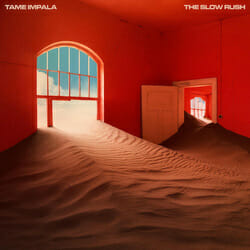 19. Tame Impala: The Slow RushIn 2012, Kevin Parker was an introvert. It’s no wonder he titled his now classic sophomore record Lonerism: Those 12 songs document the internal anger, anxiety and social self-sabotage of a man who so badly wanted to be personable and in love, but was legitimately unable to even muster up the courage to talk to a woman he was interested in. Over the best and most inventive psychedelic rock instrumentals in decades, Parker let all of his apprehensions and regrets out, knowing full well he’s “gotta be above it now” and that he “can’t let them bring me down” though he’s long realized they will. Optimism led him astray. He felt like he was only going backwards, and he was left wondering why won’t they talk to him. Eight years later, things are wildly different. Headlining festivals and writing for pop and rap stars, Kevin Parker is finally confident. He’s now wondering aloud about getting a home in Miami, going and getting married and tattooing her name on his arm (“Instant Destiny”) and thinking back on how he was feeling a year prior when he had no cares in the world (“One More Year”). He’s such a changed man that he even admits to being unable to identify with his old records: “There’s no use trying to relate to that old song,” he croons at the beginning of “Tomorrow’s Dust.” And will The Slow Rush blow your mind? Probably, but maybe in a much different way than you were likely expecting from a Tame Impala record. Instead of aiming to melt the brains of tens of thousands of twenty-somethings in a field on psychedelics (though this likely still will, let’s be honest), Parker instead turns his eye toward dancehalls, replacing fuzzy guitars and impressive percussion with bouncy piano and dance-y synths. —Steven Edelstone
19. Tame Impala: The Slow RushIn 2012, Kevin Parker was an introvert. It’s no wonder he titled his now classic sophomore record Lonerism: Those 12 songs document the internal anger, anxiety and social self-sabotage of a man who so badly wanted to be personable and in love, but was legitimately unable to even muster up the courage to talk to a woman he was interested in. Over the best and most inventive psychedelic rock instrumentals in decades, Parker let all of his apprehensions and regrets out, knowing full well he’s “gotta be above it now” and that he “can’t let them bring me down” though he’s long realized they will. Optimism led him astray. He felt like he was only going backwards, and he was left wondering why won’t they talk to him. Eight years later, things are wildly different. Headlining festivals and writing for pop and rap stars, Kevin Parker is finally confident. He’s now wondering aloud about getting a home in Miami, going and getting married and tattooing her name on his arm (“Instant Destiny”) and thinking back on how he was feeling a year prior when he had no cares in the world (“One More Year”). He’s such a changed man that he even admits to being unable to identify with his old records: “There’s no use trying to relate to that old song,” he croons at the beginning of “Tomorrow’s Dust.” And will The Slow Rush blow your mind? Probably, but maybe in a much different way than you were likely expecting from a Tame Impala record. Instead of aiming to melt the brains of tens of thousands of twenty-somethings in a field on psychedelics (though this likely still will, let’s be honest), Parker instead turns his eye toward dancehalls, replacing fuzzy guitars and impressive percussion with bouncy piano and dance-y synths. —Steven Edelstone
 18. Tennis: SwimmerRarely when uttering the words “for better or for worse” on their wedding day do couples really consider the latter half of that sentiment. Most of life’s darkest days often occur after two people have committed themselves to one another: Loved ones fall ill or die, responsibilities mount and any number of unexpected catastrophes may land on your doorstep. You’re not seeking a partner for a pleasure cruise, but rather for an intrepid, Magellan-style circumnavigation, in which sailors get scurvy or fall overboard because they mistook a manatee for a mermaid. There are moments of wonder and discovery, but often those are bookended by rough seas. Married duo Alaina Moore and Patrick Riley, better known as Tennis, have recently endured one of the most difficult stages of their life, but found solace in each other throughout. Following the commercial success of Yours Conditionally in 2017, Moore wound up in the hospital with a bad bout of the flu, Riley’s father Edward died of cancer and his mother Karen was hospitalized “on the brink of a stroke,” Moore recalls. Swimmer was borne from this heart wrenching period of time, a fitting name considering the sailing motif in Tennis’ discography (Cape Dory recounts their post-college sailing trip along the East Coast, and most of Yours Conditionally was written during their journey at sea from San Diego to the Sea of Cortez). Moore herself never learned to swim, just as most of us are not taught how to navigate the choppy waters of grief and strife. —Clare Martin
18. Tennis: SwimmerRarely when uttering the words “for better or for worse” on their wedding day do couples really consider the latter half of that sentiment. Most of life’s darkest days often occur after two people have committed themselves to one another: Loved ones fall ill or die, responsibilities mount and any number of unexpected catastrophes may land on your doorstep. You’re not seeking a partner for a pleasure cruise, but rather for an intrepid, Magellan-style circumnavigation, in which sailors get scurvy or fall overboard because they mistook a manatee for a mermaid. There are moments of wonder and discovery, but often those are bookended by rough seas. Married duo Alaina Moore and Patrick Riley, better known as Tennis, have recently endured one of the most difficult stages of their life, but found solace in each other throughout. Following the commercial success of Yours Conditionally in 2017, Moore wound up in the hospital with a bad bout of the flu, Riley’s father Edward died of cancer and his mother Karen was hospitalized “on the brink of a stroke,” Moore recalls. Swimmer was borne from this heart wrenching period of time, a fitting name considering the sailing motif in Tennis’ discography (Cape Dory recounts their post-college sailing trip along the East Coast, and most of Yours Conditionally was written during their journey at sea from San Diego to the Sea of Cortez). Moore herself never learned to swim, just as most of us are not taught how to navigate the choppy waters of grief and strife. —Clare Martin
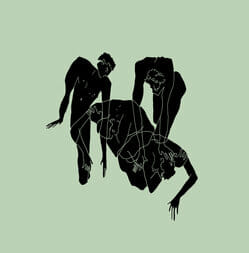 17. Cafe Racer: Shadow TalkSome psychedelic albums reach a hypnotic end cheaply. But Shadow Talk, the second album from Chicago experimental five-piece Cafe Racer, reaches heady emotional and sonic heights, not by leaning on overused effects or sprinkling meaningless, abstract imagery, but by expecting more out of a song and its lyrics. Shadow Talk is all about finesse and dynamics—melodies cascade with subtlety and spark with a euphoric glow. They’re also masters of grooves both meditative and invigorating, and they experiment with foreground and background sounds in mind-numbing ways. It’s an extremely calming album until it isn’t—the guitar and synth fury on “Faces” is life-affirming, the guitar solo in “Exile” is painfully emotive and its subsequent outro track creates blistering, ambient havoc. It’s a moody, empathetic album, bolstered by repetition and the palpable scenes they create, whether that’s an imagined, heavenly gorge or the melancholy urban landscapes you traverse every day. —Lizzie Manno
17. Cafe Racer: Shadow TalkSome psychedelic albums reach a hypnotic end cheaply. But Shadow Talk, the second album from Chicago experimental five-piece Cafe Racer, reaches heady emotional and sonic heights, not by leaning on overused effects or sprinkling meaningless, abstract imagery, but by expecting more out of a song and its lyrics. Shadow Talk is all about finesse and dynamics—melodies cascade with subtlety and spark with a euphoric glow. They’re also masters of grooves both meditative and invigorating, and they experiment with foreground and background sounds in mind-numbing ways. It’s an extremely calming album until it isn’t—the guitar and synth fury on “Faces” is life-affirming, the guitar solo in “Exile” is painfully emotive and its subsequent outro track creates blistering, ambient havoc. It’s a moody, empathetic album, bolstered by repetition and the palpable scenes they create, whether that’s an imagined, heavenly gorge or the melancholy urban landscapes you traverse every day. —Lizzie Manno
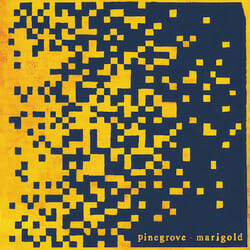 16. Pinegrove: MarigoldMarigold is the first true collection of Pinegrove songs that addresses (or doesn’t) the events that have unfolded since lead singer Evan Stephens Hall’s admission of sexual coercion in late 2017 via a Facebook post. Marigold also follows Skylight’s tendencies to aim for a softer, more delicate, more intimate sound than anything on Cardinal. Gone are the cathartic, fist-pumping moments from “Cadmium,” the louder, capital-R Rock aesthetics from “Then Again” or the bruising solos à la “Aphasia.” Hall & co. respond with a more refined batch of songs on Marigold. It seems Hall realized yelps and screams don’t necessarily attract the most attention; he now recognizes that by being even more vulnerable than ever before, he’s capable of producing his finest songwriting yet. That’s particularly obvious on “The Alarmist,” as Hall nearly whispers the final line of the first verse: “I whisper to myself / Then I’m spinning it half around / Like an echo / A faraway sound / Saying, ‘be good to me.’” Though the first stanza makes it seem like this is a song about the breakdown of a relationship and Hall’s inability to communicate effectively, that raw “be good to me” refrain feels wholly personal, directed towards himself and no one else. For the public to forgive him for his past misdeeds (if it ever will), he needs to forgive himself first to find a way forward. —Steven Edelstone
16. Pinegrove: MarigoldMarigold is the first true collection of Pinegrove songs that addresses (or doesn’t) the events that have unfolded since lead singer Evan Stephens Hall’s admission of sexual coercion in late 2017 via a Facebook post. Marigold also follows Skylight’s tendencies to aim for a softer, more delicate, more intimate sound than anything on Cardinal. Gone are the cathartic, fist-pumping moments from “Cadmium,” the louder, capital-R Rock aesthetics from “Then Again” or the bruising solos à la “Aphasia.” Hall & co. respond with a more refined batch of songs on Marigold. It seems Hall realized yelps and screams don’t necessarily attract the most attention; he now recognizes that by being even more vulnerable than ever before, he’s capable of producing his finest songwriting yet. That’s particularly obvious on “The Alarmist,” as Hall nearly whispers the final line of the first verse: “I whisper to myself / Then I’m spinning it half around / Like an echo / A faraway sound / Saying, ‘be good to me.’” Though the first stanza makes it seem like this is a song about the breakdown of a relationship and Hall’s inability to communicate effectively, that raw “be good to me” refrain feels wholly personal, directed towards himself and no one else. For the public to forgive him for his past misdeeds (if it ever will), he needs to forgive himself first to find a way forward. —Steven Edelstone
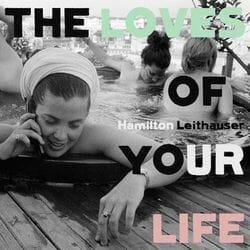 15. Hamilton Leithauser: The Loves of Your LifeWith The Loves of Your Life, former The Walkmen frontman Hamilton Leithauser expands his scope in a searching spirit, satiating his hunger for connection with the stories of others. Written about real individuals, some old friends and others strangers, the songs are as manifold as the human lives they encapsulate, with Leithauser often stepping aside to speak in his subjects’ own words. Written, recorded, produced and mixed in Leithauser’s cramped, DIY New York City studio The Struggle Hut, the album achieves a powerful sense of place, capturing the city and its innumerable narratives—NYC is well-trod creative territory, to say the least, and could have easily made for a mundane effort in the hands of a lesser songwriter. But Leithauser has spent his entire career on its wavelength, and dedicates The Loves of Your Life to the people who make the metropolis what it is, bringing all of his skills (he plays most of the instruments on the album) to bear on rendering their stories in poignant detail. —Scott Russell
15. Hamilton Leithauser: The Loves of Your LifeWith The Loves of Your Life, former The Walkmen frontman Hamilton Leithauser expands his scope in a searching spirit, satiating his hunger for connection with the stories of others. Written about real individuals, some old friends and others strangers, the songs are as manifold as the human lives they encapsulate, with Leithauser often stepping aside to speak in his subjects’ own words. Written, recorded, produced and mixed in Leithauser’s cramped, DIY New York City studio The Struggle Hut, the album achieves a powerful sense of place, capturing the city and its innumerable narratives—NYC is well-trod creative territory, to say the least, and could have easily made for a mundane effort in the hands of a lesser songwriter. But Leithauser has spent his entire career on its wavelength, and dedicates The Loves of Your Life to the people who make the metropolis what it is, bringing all of his skills (he plays most of the instruments on the album) to bear on rendering their stories in poignant detail. —Scott Russell
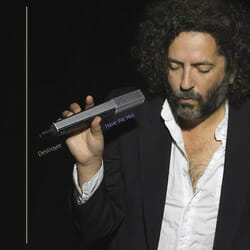 14. Destroyer: Have We MetDan Bejar’s songs often sound like part of the soundtrack to a movie that exists only in his mind. An ’80s-style noir flick, maybe, set in some retro-futuristic cityscape where wet pavement glistens with the reflection of neon lights, and the juxtaposition of idiosyncratic lyrics, Bejar’s plummy voice and the squelch of synthesizers makes perfect sense according to some obscure internal logic. That stylized artificiality has been an unspoken running theme in Bejar’s music as Destroyer, at least since Kaputt in 2011. He and bassist-producer John Collins (former bandmates in The New Pornographers) take it to the extreme on Destroyer’s latest, Have We Met, on which the only actual instruments are electric guitar and bass—and a whole lot of electronic accompaniment, including synthesizers, keyboards and beats. —Eric R. Danton
14. Destroyer: Have We MetDan Bejar’s songs often sound like part of the soundtrack to a movie that exists only in his mind. An ’80s-style noir flick, maybe, set in some retro-futuristic cityscape where wet pavement glistens with the reflection of neon lights, and the juxtaposition of idiosyncratic lyrics, Bejar’s plummy voice and the squelch of synthesizers makes perfect sense according to some obscure internal logic. That stylized artificiality has been an unspoken running theme in Bejar’s music as Destroyer, at least since Kaputt in 2011. He and bassist-producer John Collins (former bandmates in The New Pornographers) take it to the extreme on Destroyer’s latest, Have We Met, on which the only actual instruments are electric guitar and bass—and a whole lot of electronic accompaniment, including synthesizers, keyboards and beats. —Eric R. Danton
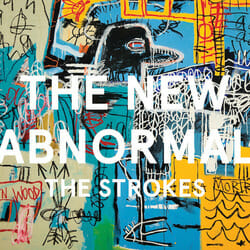 13. The Strokes: The New AbnormalLet’s face it: In 2020, nobody is expecting a new Strokes album to compete with the band’s classic, essentially perfect first two albums. When the seminal, ’70s-inspired garage rock group dropped the latter of those albums, 2003’s Room on Fire, some fans and critics complained that it sounded too similar to 2001’s groundbreaking Is This It. Seemingly in direct response to those criticisms, Julian Casablancas and co. have avoided anything resembling musical consistency on every Strokes release since. Angles’ “Taken for a Fool,” Comedown Machine’s “All the Time” and a handful of Impressions songs suggested that our leather-clad early-aughts heroes might still possess a flicker of their initial spark. That magic reappears in flashes on The New Abnormal—the first Strokes release since Future Present Past and their first full-length in seven years—but even if the album’s strong songs are among the liveliest, most effortless music the band has made in over a decade, their bursting energy only modestly offsets the LP’s many sharp lows. —Max Freedman
13. The Strokes: The New AbnormalLet’s face it: In 2020, nobody is expecting a new Strokes album to compete with the band’s classic, essentially perfect first two albums. When the seminal, ’70s-inspired garage rock group dropped the latter of those albums, 2003’s Room on Fire, some fans and critics complained that it sounded too similar to 2001’s groundbreaking Is This It. Seemingly in direct response to those criticisms, Julian Casablancas and co. have avoided anything resembling musical consistency on every Strokes release since. Angles’ “Taken for a Fool,” Comedown Machine’s “All the Time” and a handful of Impressions songs suggested that our leather-clad early-aughts heroes might still possess a flicker of their initial spark. That magic reappears in flashes on The New Abnormal—the first Strokes release since Future Present Past and their first full-length in seven years—but even if the album’s strong songs are among the liveliest, most effortless music the band has made in over a decade, their bursting energy only modestly offsets the LP’s many sharp lows. —Max Freedman
 12. Caroline Rose: Superstar“We’re gonna put you in the movies and our TV / All you’ve got to do is put on this little bikini,” indie rock chameleon Caroline Rose sang on “Bikini” off her breakout 2018 record Loner. Rose pithily skewered the objectification women must put up with when they enter the limelight and further criticizes the music industry in the accompanying video. She shakes and shimmies as a smarmy male singer, while bikini-clad babes dance behind her or unconvincingly “play” instruments. Their half-hearted performance brought to mind the women in the background of Robert Palmer videos, who serve as ornamentation at best. On Loner, Rose placed the system surrounding fame and celebrity squarely in her crosshairs. Now, though, as her star is rising, Rose has turned that critical eye inward. Superstar tells a fictionalized, though autobiographically-inspired, story about an up-and-comer seeking a life of stardom, critiquing the protagonist’s self-centered aspirations. It’s an astute pivot for Rose, and an indicator that she is anything but your typical ascendant artist. Superstar proves itself a tightly knit satire of celebrity, effective thanks to Rose’s sharp storytelling and her calculated use of distortion, which highlights the artificial quality of the protagonist’s new surroundings. —Clare Martin
12. Caroline Rose: Superstar“We’re gonna put you in the movies and our TV / All you’ve got to do is put on this little bikini,” indie rock chameleon Caroline Rose sang on “Bikini” off her breakout 2018 record Loner. Rose pithily skewered the objectification women must put up with when they enter the limelight and further criticizes the music industry in the accompanying video. She shakes and shimmies as a smarmy male singer, while bikini-clad babes dance behind her or unconvincingly “play” instruments. Their half-hearted performance brought to mind the women in the background of Robert Palmer videos, who serve as ornamentation at best. On Loner, Rose placed the system surrounding fame and celebrity squarely in her crosshairs. Now, though, as her star is rising, Rose has turned that critical eye inward. Superstar tells a fictionalized, though autobiographically-inspired, story about an up-and-comer seeking a life of stardom, critiquing the protagonist’s self-centered aspirations. It’s an astute pivot for Rose, and an indicator that she is anything but your typical ascendant artist. Superstar proves itself a tightly knit satire of celebrity, effective thanks to Rose’s sharp storytelling and her calculated use of distortion, which highlights the artificial quality of the protagonist’s new surroundings. —Clare Martin
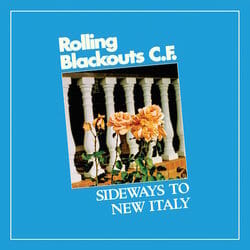 11. Rolling Blackouts Coastal Fever: Sideways to New ItalyFans of Rolling Blackouts C.F.’s The Go-Betweens-indebted, jangle-pop-tinged guitar-rock will find themselves on familiar ground on Sideways to New Italy. The quintet—which comprises singer-songwriter-guitarist trio Tom Russo, Joe White and Fran Keaney, plus bassist Joe Russo and drummer Marcel Tussie—arrived essentially fully formed with 2016’s Talk Tight, and have remained remarkably consistent since, from 2017 EP The French Press to their acclaimed full-length debut, 2018 standout Hope Downs. Their second album’s roots run deep through their creative output to this point: The chords of b-side standout “Cameo” originally belonged to Hope Downs’ abandoned title track, while the chorus of closer “The Cool Change” first appeared in a song Tom Russo, White and Keaney performed in a previous band back in the 2000s. And from those roots, the band continues to grow, excelling at their characteristically propulsive rock while making room for more emotion-imbued softness and nuanced instrumentation to shine through, a natural progression that quietly slips an arm around the listener, rather than grabbing them by the lapels. —Scott Russell
11. Rolling Blackouts Coastal Fever: Sideways to New ItalyFans of Rolling Blackouts C.F.’s The Go-Betweens-indebted, jangle-pop-tinged guitar-rock will find themselves on familiar ground on Sideways to New Italy. The quintet—which comprises singer-songwriter-guitarist trio Tom Russo, Joe White and Fran Keaney, plus bassist Joe Russo and drummer Marcel Tussie—arrived essentially fully formed with 2016’s Talk Tight, and have remained remarkably consistent since, from 2017 EP The French Press to their acclaimed full-length debut, 2018 standout Hope Downs. Their second album’s roots run deep through their creative output to this point: The chords of b-side standout “Cameo” originally belonged to Hope Downs’ abandoned title track, while the chorus of closer “The Cool Change” first appeared in a song Tom Russo, White and Keaney performed in a previous band back in the 2000s. And from those roots, the band continues to grow, excelling at their characteristically propulsive rock while making room for more emotion-imbued softness and nuanced instrumentation to shine through, a natural progression that quietly slips an arm around the listener, rather than grabbing them by the lapels. —Scott Russell
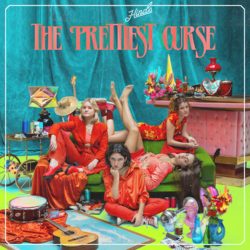 10. Hinds: The Prettiest CurseThere should be a law requiring Hinds to release all of their future albums during the summer season in perpetuity. Grant that their latest, The Prettiest Curse, dropped in June out of sober respect for the COVID-19 pandemic, which forced a reschedule from its original April 3 date. Also grant that the tone baked into every Hinds record, from 2016’s Leave Me Alone to 2018’s I Don’t Run, pairs perfectly with warm, sunny days spent driving on beachside highways with the windows rolled down, even when they’re singing about loneliness, breakups and the neverending quest for hugs and cuddles. Hinds’ usual fuzzed-up rock aesthetic bridges the gap between The Prettiest Curse and I Don’t Run nicely. The latter plays strictly in the mode of garage rock. The former reads mostly the same, but occasionally brightened with layers of pop. Effervescence is a key ingredient in all their music, but The Prettiest Curse’s bubbliness is more pronounced, the froth that shapes the band’s rising to the surface in a slightly broader coating. It’s not unusual for musicians to try updating their sound with outside influences and unexpected genres, but too often the experiment falls apart; the unfamiliar elements clang against the details that give the group character, like eating chocolate cake baked with carob. Not so with The Prettiest Curse. Hinds—Carlotta Cosials, Ana Perrote, Amber Grimbergen, and Ade Martin—have a strong grip on their musical identity, and they’re not keen on a makeover. —Andy Crump
10. Hinds: The Prettiest CurseThere should be a law requiring Hinds to release all of their future albums during the summer season in perpetuity. Grant that their latest, The Prettiest Curse, dropped in June out of sober respect for the COVID-19 pandemic, which forced a reschedule from its original April 3 date. Also grant that the tone baked into every Hinds record, from 2016’s Leave Me Alone to 2018’s I Don’t Run, pairs perfectly with warm, sunny days spent driving on beachside highways with the windows rolled down, even when they’re singing about loneliness, breakups and the neverending quest for hugs and cuddles. Hinds’ usual fuzzed-up rock aesthetic bridges the gap between The Prettiest Curse and I Don’t Run nicely. The latter plays strictly in the mode of garage rock. The former reads mostly the same, but occasionally brightened with layers of pop. Effervescence is a key ingredient in all their music, but The Prettiest Curse’s bubbliness is more pronounced, the froth that shapes the band’s rising to the surface in a slightly broader coating. It’s not unusual for musicians to try updating their sound with outside influences and unexpected genres, but too often the experiment falls apart; the unfamiliar elements clang against the details that give the group character, like eating chocolate cake baked with carob. Not so with The Prettiest Curse. Hinds—Carlotta Cosials, Ana Perrote, Amber Grimbergen, and Ade Martin—have a strong grip on their musical identity, and they’re not keen on a makeover. —Andy Crump
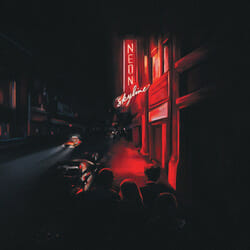 9. Andy Shauf: The Neon SkylineListening to an Andy Shauf album in full is akin to binging a particularly compelling TV show: Both pull you in with characters that feel just as real as you or me, who populate a world we’d like to escape to. It’s a world not unlike our own, but that’s part of the appeal, really. Shauf’s storytelling and uncanny realism have long been the linchpin of his appeal as an artist, though his previous release, The Party, showcased his talent on a whole other level. As a concept album, it documented the titular event, exploring vignettes about all of the party’s various attendees. Now, Shauf is following up his 2016 effort with The Neon Skyline, another concept album about a couple of friends on a night out at the pub. Every aspect of the central storyline—an ex randomly showing up after moving out of town, bad jokes, drunken ramblings—feels like it could be happening at your local dive just a couple blocks from your apartment. The intimacy of the story is bolstered by the album’s production and Shauf’s deft instrumentation. In comparison to the expansive sound of his recent work with indie four-piece Foxwarren, the woozy woodwind, warm piano and guitar (all played by Shauf himself) come across as if they are being played in the small back room of a bar. —Clare Martin
9. Andy Shauf: The Neon SkylineListening to an Andy Shauf album in full is akin to binging a particularly compelling TV show: Both pull you in with characters that feel just as real as you or me, who populate a world we’d like to escape to. It’s a world not unlike our own, but that’s part of the appeal, really. Shauf’s storytelling and uncanny realism have long been the linchpin of his appeal as an artist, though his previous release, The Party, showcased his talent on a whole other level. As a concept album, it documented the titular event, exploring vignettes about all of the party’s various attendees. Now, Shauf is following up his 2016 effort with The Neon Skyline, another concept album about a couple of friends on a night out at the pub. Every aspect of the central storyline—an ex randomly showing up after moving out of town, bad jokes, drunken ramblings—feels like it could be happening at your local dive just a couple blocks from your apartment. The intimacy of the story is bolstered by the album’s production and Shauf’s deft instrumentation. In comparison to the expansive sound of his recent work with indie four-piece Foxwarren, the woozy woodwind, warm piano and guitar (all played by Shauf himself) come across as if they are being played in the small back room of a bar. —Clare Martin
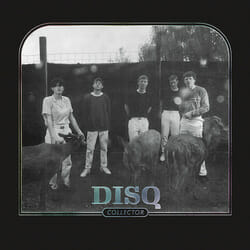 8. Disq: CollectorEven when they were young teens, it was obvious that Disq knew how to write great pop songs. Starting out as a duo of Isaac deBroux-Slone and Raina Bock in Madison, Wisc., the band self-recorded their first release—an EP titled Disq 1—in deBroux-Slone’s basement and released it in 2016. Its sweet psych and power-pop weren’t fully cooked, but it had palpable charisma and contained seeds of the wide range of sounds they’d explore in the future. After recruiting three more full-time members—Shannon Connor (guitar, keys), Logan Severson (guitar/backing vocals) and Brendan Manley (drums)—and signing to Saddle Creek for their debut album, Disq were fully equipped to bring their distinct charm and varying influences to life. While earning their stripes as an opening band, playing with acts like Shame, Jay Som and Girlpool, it was hard to determine which direction they would go since their shows were much punkier than any of their recordings up until that point. Now that their Rob Schnapf-produced (Beck, Elliott Smith) first album Collector has arrived, we have an answer: It’s perhaps more uniform in sound than their debut EP and live shows would suggest, but it shows off their dynamic guitar triple-threat, down-to-earth lyrics and instantaneous pop know-how that made them so enjoyable and relatable in the first place. —Lizzie Manno
8. Disq: CollectorEven when they were young teens, it was obvious that Disq knew how to write great pop songs. Starting out as a duo of Isaac deBroux-Slone and Raina Bock in Madison, Wisc., the band self-recorded their first release—an EP titled Disq 1—in deBroux-Slone’s basement and released it in 2016. Its sweet psych and power-pop weren’t fully cooked, but it had palpable charisma and contained seeds of the wide range of sounds they’d explore in the future. After recruiting three more full-time members—Shannon Connor (guitar, keys), Logan Severson (guitar/backing vocals) and Brendan Manley (drums)—and signing to Saddle Creek for their debut album, Disq were fully equipped to bring their distinct charm and varying influences to life. While earning their stripes as an opening band, playing with acts like Shame, Jay Som and Girlpool, it was hard to determine which direction they would go since their shows were much punkier than any of their recordings up until that point. Now that their Rob Schnapf-produced (Beck, Elliott Smith) first album Collector has arrived, we have an answer: It’s perhaps more uniform in sound than their debut EP and live shows would suggest, but it shows off their dynamic guitar triple-threat, down-to-earth lyrics and instantaneous pop know-how that made them so enjoyable and relatable in the first place. —Lizzie Manno
 7. Frances Quinlan: LikewiseThe whole idea behind releasing or performing a cover is to add your own spin to it: Otherwise, what’s the point? But rarely does an artist deconstruct and completely transform a beloved song to the extent that Frances Quinlan does with “Carry the Zero,” the Built to Spill classic that landed at number two on Paste’s best songs of 1999 list. It’s quite incredible that Quinlan managed to make the song so unrecognizable that I listened to the whole thing without even realizing it was a cover of the legendary Boise, Idaho indie band’s biggest hit. The words “I’m not knocking,” even when spoken out of context, will get “Carry the Zero” stuck in one’s head for hours. Quinlan’s ability to bend the track to her will—featuring a bouncy synth later complemented by twisted, harsh guitar screeches—is ingenious and indicative of Quinlan’s ability to experiment outside of her main sound. It’s one of many moments on Likewise that prove not only that her solo career deserves to exist, but also that she’s able to thrive without her longtime bandmates (or at least without them in their full roles). Hop Along actually began as a solo project in the mid-2000s, but by the time the band started to take off with 2012’s Get Disowned, it was a full outfit, complete with Quinlan’s brother Mark on drums, bassist Tyler Long and multi-instrumentalist Joe Reinhart, who has produced each of their records since. With each Hop Along release, as Quinlan mentioned in her recent Paste session, the four members act as a collective, workshopping the songs together after the demo stage. But on Likewise, Quinlan hashed everything out with just Reinhart in the studio, giving the tracks more space to breathe than ever before. Most of the songs here feel a bit rougher around the edges, which is partly what gives them so much charm. Quinlan has long had one of the best voices in indie rock, so why not essentially subtract everything else and give it 100 percent of the spotlight? —Steven Edelstone
7. Frances Quinlan: LikewiseThe whole idea behind releasing or performing a cover is to add your own spin to it: Otherwise, what’s the point? But rarely does an artist deconstruct and completely transform a beloved song to the extent that Frances Quinlan does with “Carry the Zero,” the Built to Spill classic that landed at number two on Paste’s best songs of 1999 list. It’s quite incredible that Quinlan managed to make the song so unrecognizable that I listened to the whole thing without even realizing it was a cover of the legendary Boise, Idaho indie band’s biggest hit. The words “I’m not knocking,” even when spoken out of context, will get “Carry the Zero” stuck in one’s head for hours. Quinlan’s ability to bend the track to her will—featuring a bouncy synth later complemented by twisted, harsh guitar screeches—is ingenious and indicative of Quinlan’s ability to experiment outside of her main sound. It’s one of many moments on Likewise that prove not only that her solo career deserves to exist, but also that she’s able to thrive without her longtime bandmates (or at least without them in their full roles). Hop Along actually began as a solo project in the mid-2000s, but by the time the band started to take off with 2012’s Get Disowned, it was a full outfit, complete with Quinlan’s brother Mark on drums, bassist Tyler Long and multi-instrumentalist Joe Reinhart, who has produced each of their records since. With each Hop Along release, as Quinlan mentioned in her recent Paste session, the four members act as a collective, workshopping the songs together after the demo stage. But on Likewise, Quinlan hashed everything out with just Reinhart in the studio, giving the tracks more space to breathe than ever before. Most of the songs here feel a bit rougher around the edges, which is partly what gives them so much charm. Quinlan has long had one of the best voices in indie rock, so why not essentially subtract everything else and give it 100 percent of the spotlight? —Steven Edelstone
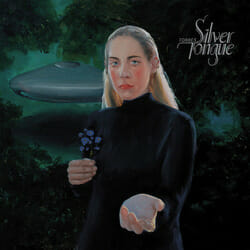 6. TORRES: Silver TongueIn April 2018, Mackenzie Scott, the preternaturally talented songwriter who records under the name TORRES, announced on Twitter that her storied label, 4AD, had dropped her from a planned three-album deal “for not being commercially successful enough.” It was an upsetting blow, particularly given the strength of TORRES’ third album, Three Futures, an alluring art-pop concept album examining bodily pleasure with Kraftwerk and CAN as aural reference points. Scott tumbled into self-doubt. “I was in a really bad place,” she reflected in a more recent interview SPIN. She considered leaving music altogether. Instead, she started writing, and didn’t stop for months. Silver Tongue, TORRES’ excellent fourth album—and first for Merge—is the result of that defiant burst. It’s not a set of sugary hooks designed to crack the Discover Weekly algorithm: The record, which is self-produced, sacrifices no ounce of Scott’s sharp-angled, emotionally explosive songcraft. It leans into the electro-pop atmosphere of Three Futures, but the textures are so unsettling and lonely that it would never scan as a bid for crossover appeal. Scott remains an improbably vivid writer both lyrically and melodically; throughout Silver Tongue, she takes desire and infatuation as her subject and icy synthesizers as her instrument of choice. —Zach Schonfeld
6. TORRES: Silver TongueIn April 2018, Mackenzie Scott, the preternaturally talented songwriter who records under the name TORRES, announced on Twitter that her storied label, 4AD, had dropped her from a planned three-album deal “for not being commercially successful enough.” It was an upsetting blow, particularly given the strength of TORRES’ third album, Three Futures, an alluring art-pop concept album examining bodily pleasure with Kraftwerk and CAN as aural reference points. Scott tumbled into self-doubt. “I was in a really bad place,” she reflected in a more recent interview SPIN. She considered leaving music altogether. Instead, she started writing, and didn’t stop for months. Silver Tongue, TORRES’ excellent fourth album—and first for Merge—is the result of that defiant burst. It’s not a set of sugary hooks designed to crack the Discover Weekly algorithm: The record, which is self-produced, sacrifices no ounce of Scott’s sharp-angled, emotionally explosive songcraft. It leans into the electro-pop atmosphere of Three Futures, but the textures are so unsettling and lonely that it would never scan as a bid for crossover appeal. Scott remains an improbably vivid writer both lyrically and melodically; throughout Silver Tongue, she takes desire and infatuation as her subject and icy synthesizers as her instrument of choice. —Zach Schonfeld
 5. Phoebe Bridgers: PunisherHer sophomore album Punisher cements what may be Bridgers’ most understated gift of all: her seemingly innate ability to capture the mundanity of modern sadness in song. Tucked in among the record’s memorable melodies, clever arrangements and impressive guests are a steady stream of details that lend plainspoken perspective to Bridgers’ emotional highs and (mostly) lows. These kinds of details ground her work in the same way shading makes a still life painting pop. They make them feel not just sad, but real. As an example, look back to “Funeral,” one of the highlights of Bridgers’ 2017 debut Stranger in the Alps. It’s a devastating tune about death and depression, and if it ended at the three-minute mark, it would still be a stunner. But she tacks on an extra bit that contextualizes the rest of the song: “It’s 4 a.m. again,” she sings flatly, “and I’m doing nothing again.” And all of a sudden … you’re there. Because you’ve been there (probably), and because Bridgers has been there, too, and she knows how to make this song about a stranger’s overdose into a highly relatable moment. The story now has a place to sit—in a dark room, screen glowing, silence deafening, thoughts racing. Again. Those kinds of moments pop up all over Punisher, which is generally noisier and more upbeat than its predecessor. The album’s clear standout (and one of the year’s best songs), “Kyoto,” features Bridgers’ crunchiest guitar riffs yet, a soaring chorus and the travails of dealing with someone who can’t quite get their shit together juxtaposed with a wander through a 7-11 and trip to the suburbs to stare at chemtrails. “I don’t forgive you,” she sings as a horn arrangement crests over this mind-numbing scene, “but please don’t hold me to it.” Later, in “Moon Song,” Bridgers traces the blurry boundaries of a complicated relationship before laying it all out in the final verse: “You are sick and you’re married and you might be dying,” she sings over a small crescendo, “but you’re holding me like water in your hands.” —Ben Salmon
5. Phoebe Bridgers: PunisherHer sophomore album Punisher cements what may be Bridgers’ most understated gift of all: her seemingly innate ability to capture the mundanity of modern sadness in song. Tucked in among the record’s memorable melodies, clever arrangements and impressive guests are a steady stream of details that lend plainspoken perspective to Bridgers’ emotional highs and (mostly) lows. These kinds of details ground her work in the same way shading makes a still life painting pop. They make them feel not just sad, but real. As an example, look back to “Funeral,” one of the highlights of Bridgers’ 2017 debut Stranger in the Alps. It’s a devastating tune about death and depression, and if it ended at the three-minute mark, it would still be a stunner. But she tacks on an extra bit that contextualizes the rest of the song: “It’s 4 a.m. again,” she sings flatly, “and I’m doing nothing again.” And all of a sudden … you’re there. Because you’ve been there (probably), and because Bridgers has been there, too, and she knows how to make this song about a stranger’s overdose into a highly relatable moment. The story now has a place to sit—in a dark room, screen glowing, silence deafening, thoughts racing. Again. Those kinds of moments pop up all over Punisher, which is generally noisier and more upbeat than its predecessor. The album’s clear standout (and one of the year’s best songs), “Kyoto,” features Bridgers’ crunchiest guitar riffs yet, a soaring chorus and the travails of dealing with someone who can’t quite get their shit together juxtaposed with a wander through a 7-11 and trip to the suburbs to stare at chemtrails. “I don’t forgive you,” she sings as a horn arrangement crests over this mind-numbing scene, “but please don’t hold me to it.” Later, in “Moon Song,” Bridgers traces the blurry boundaries of a complicated relationship before laying it all out in the final verse: “You are sick and you’re married and you might be dying,” she sings over a small crescendo, “but you’re holding me like water in your hands.” —Ben Salmon
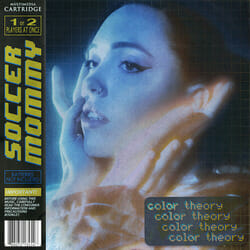 4. Soccer Mommy: color theoryAlthough Soccer Mommy’s 2018 debut studio album Clean transformed her into a critical favorite, indie-rock leader and tour opener for Paramore, Kacey Musgraves and Vampire Weekend, anyone who’s grappled with mental illness knows that success isn’t a salve. Following Clean, Soccer Mommy (real name Sophie Allison) became especially vocal about her struggles with body dysmorphia, depression and anxiety. These challenges lied solely at the periphery of Clean’s tales about youthful, regretful romantic breakdowns and insecurities, but on her eagerly anticipated Clean follow-up color theory, Allison bravely pulls her mental illness from the sidelines to the forefront, and she also tackles a grave subject she’s spoken about far less frequently: her mother’s terminal cancer. Success neither curing mental illness nor reversing a parent’s medical death sentence is a lot for a 22-year-old to face, but Allison is more than up to the task. color theory is an astounding feat of lyricism as clever as it is devastating, and Allison’s songwriting, production and voice are likewise orders of magnitude stronger than they were on Clean, recalling ’90s alt radio while pushing Soccer Mommy in galvanizing new directions. To call it an early contender for the year’s best indie rock album wouldn’t be an exaggeration. —Max Freedman
4. Soccer Mommy: color theoryAlthough Soccer Mommy’s 2018 debut studio album Clean transformed her into a critical favorite, indie-rock leader and tour opener for Paramore, Kacey Musgraves and Vampire Weekend, anyone who’s grappled with mental illness knows that success isn’t a salve. Following Clean, Soccer Mommy (real name Sophie Allison) became especially vocal about her struggles with body dysmorphia, depression and anxiety. These challenges lied solely at the periphery of Clean’s tales about youthful, regretful romantic breakdowns and insecurities, but on her eagerly anticipated Clean follow-up color theory, Allison bravely pulls her mental illness from the sidelines to the forefront, and she also tackles a grave subject she’s spoken about far less frequently: her mother’s terminal cancer. Success neither curing mental illness nor reversing a parent’s medical death sentence is a lot for a 22-year-old to face, but Allison is more than up to the task. color theory is an astounding feat of lyricism as clever as it is devastating, and Allison’s songwriting, production and voice are likewise orders of magnitude stronger than they were on Clean, recalling ’90s alt radio while pushing Soccer Mommy in galvanizing new directions. To call it an early contender for the year’s best indie rock album wouldn’t be an exaggeration. —Max Freedman
 3. Porridge Radio: Every BadEmotions are not absolute. Interpreting your own while trying to navigate the emotions of others is one of the hardest parts of being a human. The things we want and need are always changing, and trying to communicate that to other people often leads to confusion or frustration. Plus, when you’re battling your own demons, it makes things even harder. How do we make things better and dig ourselves out of a hole—especially if we don’t see the hole or if that hole has become comfortable? Brighton, U.K. quartet Porridge Radio grapple with these questions on their new album Every Bad. It’s their first LP since signing with Secretly Canadian, and it follows their 2016 self-recorded debut Rice, Pasta and Other Fillers. Through scratchy indie rock (“Don’t Ask Me Twice,” “Give/Take”), grand punk (“Lilac”) and even auto-tuned pop (“Something”), Porridge Radio take pop songs much further than listeners might’ve thought possible. They want us to know that it’s okay to not have all the answers, and it’s okay to feel contradictory emotions. They shout repeated lines like they’re therapeutically screaming into the void, but surprisingly, listening to it is just as therapeutic. It’s one thing for a band to capture a world in chaos, but it’s much more difficult to accurately capture a mind in chaos—Porridge Radio make it look like a cakewalk. Every Bad is the nuanced album that indie rock has needed for years. —Lizzie Manno
3. Porridge Radio: Every BadEmotions are not absolute. Interpreting your own while trying to navigate the emotions of others is one of the hardest parts of being a human. The things we want and need are always changing, and trying to communicate that to other people often leads to confusion or frustration. Plus, when you’re battling your own demons, it makes things even harder. How do we make things better and dig ourselves out of a hole—especially if we don’t see the hole or if that hole has become comfortable? Brighton, U.K. quartet Porridge Radio grapple with these questions on their new album Every Bad. It’s their first LP since signing with Secretly Canadian, and it follows their 2016 self-recorded debut Rice, Pasta and Other Fillers. Through scratchy indie rock (“Don’t Ask Me Twice,” “Give/Take”), grand punk (“Lilac”) and even auto-tuned pop (“Something”), Porridge Radio take pop songs much further than listeners might’ve thought possible. They want us to know that it’s okay to not have all the answers, and it’s okay to feel contradictory emotions. They shout repeated lines like they’re therapeutically screaming into the void, but surprisingly, listening to it is just as therapeutic. It’s one thing for a band to capture a world in chaos, but it’s much more difficult to accurately capture a mind in chaos—Porridge Radio make it look like a cakewalk. Every Bad is the nuanced album that indie rock has needed for years. —Lizzie Manno
 2. Waxahatchee: Saint CloudIn 2017, Waxahatchee’s Katie Crutchfeld quite literally blew the music world away. Her record Out in the Storm, which we named one of the best albums of that year, displayed a whole new side of the singer. Gone were the fortified bedroom pop of 2015’s Ivy Tripp, the rock-tinged freak-folk musings of her 2013 stunner Cerulean Salt and the brainy lo-fi recordings of her 2012 debut American Weekend. Out in the Storm sounds like its title suggests: loud, windy, chaotic and emotionally intense—a tried-and-true breakup album and a throwback to Crutchfield’s punk roots. If Out in the Storm was a tornado of sound and emotion, Saint Cloud, Crutchfield’s fifth album under the Waxahatchee alias (out Friday, March 27 on Merge Records) is the calm that comes afterwards. In some ways, it possesses little pieces of all the musical lives Crutchfield has lived before: punk-y vocals à la her once-upon-a-time rock band with Allison, P.S. Eliot, searing, Dylan-esque vocal delivery, chiming guitars straight off Out in the Storm, pastoral folk not unlike that of her 2018 EP Great Thunder. The songwriting remains impeccable. Within 10 seconds, you know—without a doubt—it’s a Waxahatchee album. Yet, it’s different from anything she’s ever released before. Saint Cloud is Crutchfield’s country/Americana record. It runs on twang, jangle, truth and wide open spaces; on the album cover, Crutchfield, dressed in a billowy baby-blue frock, sprawls across an old Ford truck bearing a license plate from her native Alabama. “Can’t Do Much,” a single released ahead of the record, possesses that old-time lilt and a head-over-heels chorus that sounds like something Lucinda Williams may have spat out on Essence. Saint Cloud is a whole new world. —Ellen Johnson
2. Waxahatchee: Saint CloudIn 2017, Waxahatchee’s Katie Crutchfeld quite literally blew the music world away. Her record Out in the Storm, which we named one of the best albums of that year, displayed a whole new side of the singer. Gone were the fortified bedroom pop of 2015’s Ivy Tripp, the rock-tinged freak-folk musings of her 2013 stunner Cerulean Salt and the brainy lo-fi recordings of her 2012 debut American Weekend. Out in the Storm sounds like its title suggests: loud, windy, chaotic and emotionally intense—a tried-and-true breakup album and a throwback to Crutchfield’s punk roots. If Out in the Storm was a tornado of sound and emotion, Saint Cloud, Crutchfield’s fifth album under the Waxahatchee alias (out Friday, March 27 on Merge Records) is the calm that comes afterwards. In some ways, it possesses little pieces of all the musical lives Crutchfield has lived before: punk-y vocals à la her once-upon-a-time rock band with Allison, P.S. Eliot, searing, Dylan-esque vocal delivery, chiming guitars straight off Out in the Storm, pastoral folk not unlike that of her 2018 EP Great Thunder. The songwriting remains impeccable. Within 10 seconds, you know—without a doubt—it’s a Waxahatchee album. Yet, it’s different from anything she’s ever released before. Saint Cloud is Crutchfield’s country/Americana record. It runs on twang, jangle, truth and wide open spaces; on the album cover, Crutchfield, dressed in a billowy baby-blue frock, sprawls across an old Ford truck bearing a license plate from her native Alabama. “Can’t Do Much,” a single released ahead of the record, possesses that old-time lilt and a head-over-heels chorus that sounds like something Lucinda Williams may have spat out on Essence. Saint Cloud is a whole new world. —Ellen Johnson
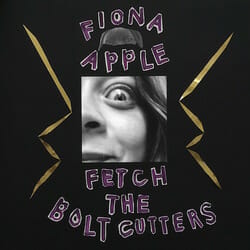 1. Fiona Apple: Fetch the Bolt CuttersFiona Apple engages our minds like no one else. Like every record before it, her latest album Fetch the Bolt Cutters taps into both the repulsive and the revolutionary. Apple has never been one to deliver approachable melodies or catchy choruses—she repeatedly serves us the abnormal, in all its twisted glory, with minor chords and off-kilter rhythms, often constructed with everyday objects rather than musical instruments. As a woman who lives mostly secluded from society and releases music so rarely, she’s frequently the object of speculation and even sexualization (see: the late ’90s). She doesn’t like to do what is expected of her. She’s said as much. So it’s funny that Fetch the Bolt Cutters is exactly what so many expected it to be: brilliant. In a surprise to probably no one, Fiona Apple is now five for five. Over the last 25 years, she has made five albums that have all—in due time—ascended to holy text status, even if it took some longer than others to come around to her genius. Her most recent, the staggeringly good The Idler Wheel… arrived in 2012. Before that: Extraordinary Machine, in 2005. But Apple isn’t just sitting on these songs during the long gaps between albums; she’s buffing them to perfection. Fetch the Bolt Cutters is finally here, and it’s another miraculous case of bottled lightning. Listening to Fiona Apple is often like bearing witness to a prophet speaking in tongues. It can be difficult, at times, to make out what exactly she’s getting at in any given verse, but there’s an overwhelming sensation that what she’s singing is vastly important. In Fetch the Bolt Cutters’ case, these psalms beam clearer than ever before. —Ellen Johnson
1. Fiona Apple: Fetch the Bolt CuttersFiona Apple engages our minds like no one else. Like every record before it, her latest album Fetch the Bolt Cutters taps into both the repulsive and the revolutionary. Apple has never been one to deliver approachable melodies or catchy choruses—she repeatedly serves us the abnormal, in all its twisted glory, with minor chords and off-kilter rhythms, often constructed with everyday objects rather than musical instruments. As a woman who lives mostly secluded from society and releases music so rarely, she’s frequently the object of speculation and even sexualization (see: the late ’90s). She doesn’t like to do what is expected of her. She’s said as much. So it’s funny that Fetch the Bolt Cutters is exactly what so many expected it to be: brilliant. In a surprise to probably no one, Fiona Apple is now five for five. Over the last 25 years, she has made five albums that have all—in due time—ascended to holy text status, even if it took some longer than others to come around to her genius. Her most recent, the staggeringly good The Idler Wheel… arrived in 2012. Before that: Extraordinary Machine, in 2005. But Apple isn’t just sitting on these songs during the long gaps between albums; she’s buffing them to perfection. Fetch the Bolt Cutters is finally here, and it’s another miraculous case of bottled lightning. Listening to Fiona Apple is often like bearing witness to a prophet speaking in tongues. It can be difficult, at times, to make out what exactly she’s getting at in any given verse, but there’s an overwhelming sensation that what she’s singing is vastly important. In Fetch the Bolt Cutters’ case, these psalms beam clearer than ever before. —Ellen Johnson